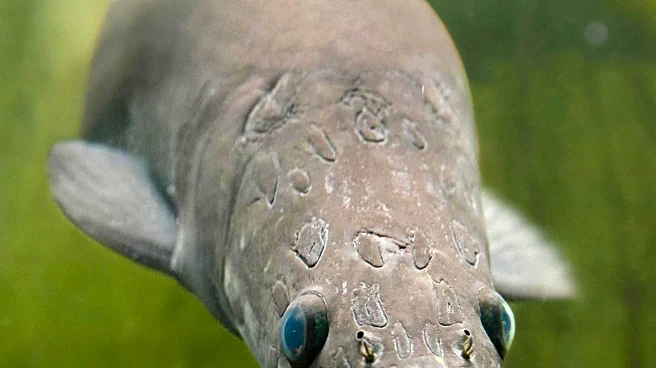What is the story about?
What's Happening?
A diver off Vancouver Island had a close encounter with a giant wolf eel, measuring 2.5 meters in length. These creatures are known to inhabit the west coast of North America, extending to Russia and the Sea of Japan. Wolf eels typically reside in caves and rock crevices, waiting to ambush prey such as urchins and shellfish, particularly crabs. Despite their formidable appearance and strong jaws designed for crunching prey, wolf eels are not considered dangerous to humans. The encounter was captured on video at Telegraph Cove, showcasing the eel's curious and puppy-like behavior.
Why It's Important?
The encounter with the wolf eel underscores the rich marine biodiversity present in the waters off Vancouver Island. Such interactions provide valuable insights into the behavior and ecology of marine species, contributing to conservation efforts and public awareness about marine life. Understanding the habits and habitats of creatures like the wolf eel can aid in the development of strategies to protect these ecosystems from threats such as pollution and overfishing. Additionally, these encounters can enhance ecotourism, drawing attention to the unique wildlife experiences available in the region.
What's Next?
Further studies and observations of wolf eels and similar marine species can help scientists better understand their role in the ecosystem. Conservationists may use such data to advocate for protective measures in marine habitats. Additionally, the growing interest in marine biodiversity could lead to increased funding for research and conservation initiatives. Local authorities might also consider promoting responsible ecotourism to ensure that interactions with wildlife do not disturb their natural behaviors.
Beyond the Headlines
The presence of wolf eels and other unique marine species highlights the importance of preserving underwater habitats. Ethical considerations arise regarding human interactions with wildlife, emphasizing the need for guidelines to ensure that such encounters are respectful and non-invasive. Long-term shifts in marine biodiversity could be influenced by climate change, necessitating ongoing research to monitor these changes and adapt conservation strategies accordingly.

















